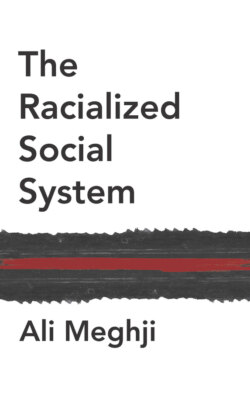Читать книгу The Racialized Social System - Ali Meghji - Страница 6
Introduction: Critical Race Theory as Social Theory
ОглавлениеIn September 2020, President Donald Trump described critical race theory (CRT) as being ‘like a cancer’, labelling CRT as an anti-American ideology ‘deployed to rip apart friends, neighbours, and families’. This presidential furore resulted in an executive order which banned the teaching of CRT in employee training schemes run by the federal agency or any company with a government contract. Across the Atlantic, those in Britain were happy to echo Trump’s disparaging of CRT. The state’s Minister for Equalities, Kemi Badenoch, claimed that the government ‘stood unequivocally against critical race theory’, while reactionary actor-turned-politician Laurence Fox wrote: ‘Let’s call Critical Race theory by its real name. Modern Racism. It’s organised and it’s scary’,1 and journalist Guy Birchall exclaimed that ‘The type of people that whine about endemic white supremacy, critical race theory and “decolonising” things fundamentally dislike Britain and Western culture.’ Commentators in Australia likewise were criticizing CRT as being part of a grievance culture whereby ‘Any individual who fights against the Theory is deemed by the Theory to be racist anyway and will be condemned as racist by activists or the diversity police.’2
However, despite having a shared hostility towards CRT, such commentators often had quite disparate accounts of what CRT actually is. While Trump lumped together CRT with ‘Marxist ideology’ and the supposed militarism of Black Lives Matter, in Britain CRT was seen as being an offshoot of the ‘decolonizing’ movement which sought to recognize the darker side of Britain’s history, and in Australia CRT was seen as being part of a wider ‘wokeist’ social justice movement. Indeed, academics likewise have differed quite radically in their understandings of what CRT is. While several Marxist critics have seen CRT as being an assertion of race-centrism steeped in identity politics (for instance Cole 2009a, 2009b), other scholars more sympathetic to the CRT project have still described it as ‘not a unified theory but a loose hodgepodge of analytic tools that are frequently used in a catch-as-catch-can manner’ (Treviño et al. 2008: 9). Indeed, CRT is not even mentioned in Emirbayer and Desmond’s (2015: 1) recent survey of theories of race/ism, despite their assertion that ‘there never has been a comprehensive and systematic theory of race’.
In a sense, these brief anecdotes quite neatly summarize both why I write this book, and how I will approach the book’s content. On the one hand, this book is written very much as an attempt to define the conceptual contours of CRT through what has been termed the racialized social system approach. Through showing how the racialized social system approach is a social theory, this book therefore highlights how CRT offers a flexible framework used to study contemporary societal arrangements in a way that is grounded in empirical research. Central to the racialized social system approach is the attempt to show how racial inequality is embodied in the structure of society and reproduced through the micro, meso and macro levels. Of course, it is through exposing this structural presence of racism that CRT has managed to attract such a large following of reactionary disparagement. In this regard, I also write this book to show how the public and political responses to CRT often demonstrate the very same points that CRT seeks to make about how racism becomes ‘hidden away’ and denied in society. Furthermore, if we think about these public criticisms of CRT, they are not limited to one nation state but instead spread transnationally. While CRT is often construed as being a US-centric paradigm of thought, this book therefore shows how – by virtue of being a social theory grounded in empirical research – CRT offers a flexible approach to the study of racial inequality across space and time.
There is a difference between conceptual flexibility and theoretical universalism. As highlighted by postcolonial and decolonial approaches, universalism is characterized by an assumption that despite a theory ‘being the product of such a specific milieu […] the thoughts produced […] simply apply universally’ (Connell 2018: 401). Claims to universalism are thus layered in relations of epistemic domination, constituted by a chauvinism where the ‘Theory’ is the ‘Theory of everything’, and everything must be comprehended through the lens of this Theory.
It is not the aim of this book to present a picture of CRT as a conceptual framework that can study all dimensions of racialization and racism across all of time and space. Such a universalism, in fact, would be in tension with CRT’s mission to battle epistemic inequality and to theorize creatively in and through empirical research. Rather, it is my aim to show how CRT – particularly through the racialized social system approach – despite emerging from a very specific discipline of legal studies, at a very specific time in the US post-civil rights era, does in fact offer a flexible conceptual framework that is useful for the study of racialization and racism across the world. Of course, before proceeding into a fuller discussion of such conceptual flexibility, it is useful to first clarify these roots and routes of CRT.
